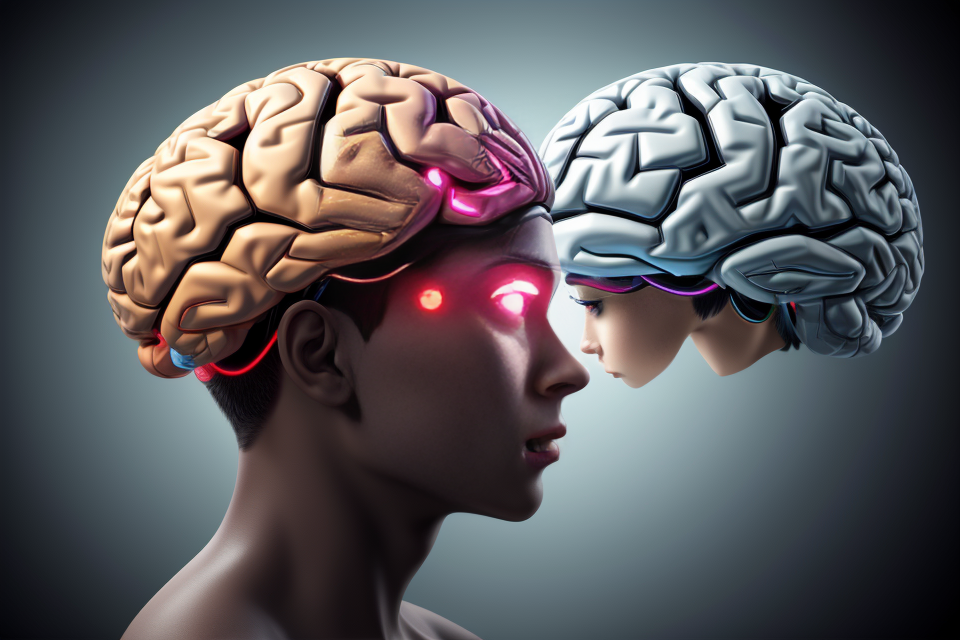Video games have been a part of our lives for several decades now, and their popularity has only continued to grow. But while many people see them as a form of entertainment, others have raised concerns about the potential effects they may have on the brain. Do video games really have an impact on our cognitive abilities, or are they just a harmless form of fun? In this comprehensive study, we will explore the science behind video games and their effects on the brain, looking at both the positive and negative impacts they may have. From improved hand-eye coordination to increased aggression and violence, we will examine the various ways in which video games can affect our brains and behavior. So join us as we dive into the world of gaming and discover what it could mean for our minds.
What are Video Games?
Video games are interactive electronic games that are played on a variety of devices, including personal computers, gaming consoles, and mobile devices. They typically involve a player controlling a character or object on a screen, navigating through a virtual environment, and completing tasks or challenges.
Definition of video games
The definition of video games can vary depending on the source, but they are generally defined as electronic games that involve interaction with a computer or console through a controller or keyboard. Video games can be played alone or with others, and can take many forms, from simple puzzle games to complex role-playing games with elaborate storylines.
Brief history of video games
The history of video games dates back to the 1960s, with the development of early arcade games like Pong. Over the years, video games have evolved significantly in terms of technology, graphics, and gameplay, with the introduction of home consoles like the Nintendo Entertainment System and the rise of online gaming. Today, video games are a multi-billion dollar industry with a global audience of millions of players.
Types of video games
There are many different types of video games, including:
- Action games: These games involve fast-paced gameplay and often require quick reflexes. Examples include first-person shooters and fighting games.
- Adventure games: These games typically involve a storyline and puzzle-solving. Examples include point-and-click adventure games and open-world exploration games.
- Role-playing games (RPGs): These games involve creating a character and navigating through a virtual world, often with a team of other players. Examples include classic RPGs like Final Fantasy and modern multiplayer RPGs like World of Warcraft.
- Strategy games: These games involve planning and executing tactics to achieve a goal. Examples include real-time strategy games like StarCraft and turn-based strategy games like Civilization.
- Sports games: These games simulate real-life sports, allowing players to control teams or individual athletes. Examples include FIFA and Madden NFL.
- Simulation games: These games simulate real-world activities, such as running a business or managing a city. Examples include SimCity and The Sims.
- Puzzle games: These games involve solving challenges or puzzles, often with a time limit. Examples include Tetris and Candy Crush.
How Video Games Affect the Brain
Overview of the Brain and Its Functions
The human brain is a complex organ that controls various functions of the body, including movement, senses, emotions, and thoughts. It consists of different regions that work together to perform various tasks. The brain is responsible for processing information, making decisions, and controlling behavior.
How Video Games Affect Brain Development
Research has shown that video games can affect the brain in both positive and negative ways. Playing video games can enhance certain cognitive skills, such as spatial awareness, reaction time, and attention. However, excessive playing of video games can lead to decreased attention and memory, as well as an increased risk of developing addiction.
Effects of Video Games on Different Parts of the Brain
Video games can affect different parts of the brain, including the prefrontal cortex, the hippocampus, and the cerebellum. The prefrontal cortex is responsible for decision-making, planning, and problem-solving. Video games can improve the functioning of this region by increasing the capacity for multitasking and enhancing cognitive control. The hippocampus is responsible for memory formation and spatial navigation. Video games can improve the functioning of this region by enhancing spatial awareness and improving navigation skills. The cerebellum is responsible for coordination and motor control. Video games can improve the functioning of this region by enhancing hand-eye coordination and reaction time.
Comparison of the Effects of Different Types of Video Games
Different types of video games can have different effects on the brain. For example, action video games can improve spatial awareness and enhance visual attention, while puzzle video games can improve problem-solving skills and enhance working memory. However, violent video games have been associated with increased aggression and decreased empathy. Therefore, it is important to consider the type of video game being played and the amount of time spent playing when examining the effects of video games on the brain.
The Pros and Cons of Video Games
Positive effects of video games on the brain
- Cognitive Development: Studies have shown that playing video games can improve cognitive abilities such as spatial awareness, reaction time, and decision-making skills.
- Hand-Eye Coordination: Video games require players to rapidly respond to visual stimuli, which can improve hand-eye coordination over time.
- Memory Enhancement: Some video games, particularly puzzle and strategy games, have been shown to improve memory and pattern recognition skills.
- Multitasking Abilities: Video games often require players to switch between multiple tasks and priorities, which can improve multitasking abilities.
Negative effects of video games on the brain
- Addiction: Excessive gaming can lead to addiction, which can negatively impact other areas of a person’s life, such as relationships and work.
- Violence and Aggression: Some studies have suggested that playing violent video games can increase aggressive behavior in players, although this is a controversial topic.
- Sleep Deprivation: Playing video games late into the night can disrupt sleep patterns and lead to sleep deprivation.
- Social Isolation: Spending too much time playing video games can lead to social isolation and decreased social skills.
Discussion of the potential risks and benefits of playing video games
While there are potential risks associated with playing video games, it is important to note that not all studies point to negative effects. In fact, many studies suggest that playing video games can have a range of cognitive and social benefits. It is up to individuals and parents to weigh the potential risks and benefits and make informed decisions about how much time to spend playing video games. Additionally, it is important to encourage a balanced approach to gaming, with time set aside for other activities such as physical exercise, socializing, and pursuing hobbies and interests.
The Science Behind Video Game Effects on the Brain
Overview of Scientific Studies on Video Game Effects on the Brain
A multitude of scientific studies have been conducted to determine the impact of video games on the human brain. These studies have explored various aspects of video game effects, including cognitive processing, brain structure and function, and behavioral outcomes. The results of these studies have provided valuable insights into the complex relationship between video games and brain function.
Methodology of the Studies
The methodology of these studies has varied widely, with some employing neuroimaging techniques such as functional magnetic resonance imaging (fMRI) to observe changes in brain activity, while others have employed controlled experiments to assess cognitive performance. Some studies have also involved longitudinal designs, tracking changes in brain function and behavior over time.
Key Findings and Conclusions
Overall, the scientific literature suggests that video games can have both positive and negative effects on the brain. Some of the key findings include:
- Cognitive Benefits: Many studies have found that video games can improve cognitive abilities such as spatial navigation, attention, and reaction time.
- Brain Plasticity: Video games have been shown to promote brain plasticity, the ability of the brain to change and adapt in response to new experiences.
- Positive Effects on Memory: Some studies have found that video games can improve working memory and other aspects of memory function.
- Negative Effects on Social Skills: Video games have been linked to decreased social skills and increased isolation in some individuals.
- Possible Link to Addiction: There is evidence to suggest that video games may be addictive for some individuals, leading to negative consequences such as decreased academic performance and impaired social functioning.
It is important to note that the results of these studies are not always consistent, and more research is needed to fully understand the complex relationship between video games and brain function.
Future Research on Video Game Effects on the Brain
Despite the extensive research conducted on the effects of video games on the brain, there are still several limitations that need to be addressed in future studies. These limitations include the need for more diverse sample populations, the need for longer-term studies, and the need for more rigorous experimental designs.
Suggestions for future research include investigating the effects of different types of video games, such as first-person shooters and puzzle games, on different cognitive processes. Additionally, future studies could explore the potential therapeutic uses of video games for cognitive and motor rehabilitation.
It is important to continue studying the effects of video games on the brain, as the technology and gaming industry continues to evolve. With the increasing popularity of virtual reality and augmented reality games, it is important to understand how these new forms of gaming may impact the brain. Furthermore, as the gaming industry becomes more accessible to a wider range of populations, it is important to investigate how the effects of video games may vary across different demographics.
Overall, continued research on the effects of video games on the brain is crucial for understanding the potential benefits and drawbacks of this increasingly popular form of entertainment.
FAQs
1. Do video games have an effect on the brain?
Yes, video games can have an effect on the brain. Research has shown that playing video games can lead to changes in the brain, including changes in the areas responsible for spatial reasoning, attention, and memory.
2. What kind of changes happen in the brain when people play video games?
Studies have found that playing video games can lead to changes in the brain‘s structure and function. For example, research has shown that playing action video games can improve certain aspects of visual perception and attention. Additionally, playing video games has been linked to changes in the brain‘s reward system, which may lead to increased feelings of pleasure and motivation.
3. Are all video games equally effective at changing the brain?
No, not all video games are equally effective at changing the brain. Research has shown that certain types of video games, such as action and puzzle games, may be more effective at promoting brain changes than other types of games. Additionally, the amount of time spent playing a game and the level of engagement with the game may also play a role in the extent of brain changes.
4. Can video games be used as a tool for cognitive training?
Yes, video games can be used as a tool for cognitive training. Research has shown that playing certain types of video games can improve cognitive skills such as attention, working memory, and spatial reasoning. Additionally, some video games have been specifically designed for use in cognitive training programs, with the goal of improving real-world cognitive abilities.
5. Are there any negative effects of playing video games on the brain?
While research has shown that playing video games can have a number of positive effects on the brain, there are also some potential negative effects to consider. For example, excessive or addictive gaming has been linked to changes in the brain‘s reward system, which may lead to decreased motivation and social interaction. Additionally, some studies have suggested that violent video games may be associated with increased aggression and decreased empathy. However, more research is needed to fully understand the potential negative effects of playing video games.




